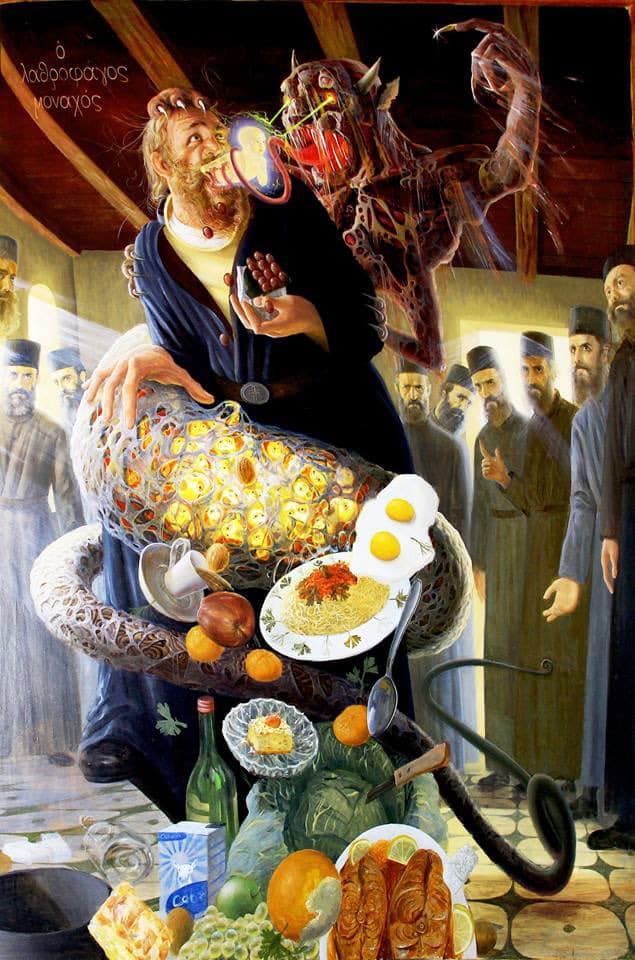In the guest house of the Dochiariou Monastery on Mount Athos in Greece, there hangs an unsettling painting of a reported miracle that occurred in one of the monasteries there. As the report of the miracle goes, a monk had stolen some food from the kitchen and eaten it in secret isolation. In this, the monk had violated the vows of fasting he and the other monks had taken. Some time passed, and the monk thought his infraction had escaped notice. Then came the Great Vespers on the evening of a feast day. On this occasion, the monks would join together for prayer and singing and worship, followed by a communal meal of celebration. After the worship service, all the monks gathered in the dining hall to sit down to a particular feast. But before the secret eater could swallow one bite of the prepared delicacies, a chasm opened up beside him and a demon appeared. This demon then greedily consumed the secret eater’s soul. The painting depicts that moment when the demon eats the monk’s golden soul, and it is about as disturbing as you might imagine.

The Monk’s Main Sin
I hear the story of this reported miracle, and it strikes me as odd for many reasons. But one thing sticks with me most. To me, stealing food and breaking vows constitute the very worst of the monk’s sins. And I likely wouldn’t fault him all that much for even those things. And perhaps neither would even his fellow monks, who knew the pangs of hunger better than most. To those monks, though, the main sin lay in eating in secret, isolated from his brothers. That’s why the artist called his painting “The Secret Eater Monk” rather than “The Food Thief Monk” or “The Fast-Breaking Monk.”
Because the monks knew that God understands and has compassion on our frailty. And God could and does understand stealing food (Prov. 6:30) or breaking a fast vow (1 Sam. 14:24f). That’s just need and weakness, for which God, and even other people, generally show great compassion. But the monks had a completely different view of the eating in isolation—that they thought God would never take lightly. And this strikes me as exceedingly odd. Why did that matter so much to them?
Secret Eating
For us, especially in the United States, eating in relative isolation has become the norm. Even members of families who live in the same house will often eat separately, mostly for convenience. And we’re all mostly accustomed to getting something fast from a drive-through and eating it alone in our cars. But Christians in ancient times, and even ancient people in general, would have seen eating alone as anti-social at best, even downright unvirtuous.
Even non-Christians in ancient Greco-Roman culture generally frowned on eating alone. Plutarch, the Greek biographer and philosopher, said, “To eat alone does not mean that he is having a meal, but that he is filling his stomach like animals.” If even pagans thought that, consider how much more Christians would have rejected any habit of non-communal meals. This makes far more sense of the miracle on Mount Athos, I think. But still, this all feels foreign to me.
Secret Reading
But it gets even stranger. The ancients didn’t just condemn eating alone, they also had a distaste for reading alone, especially in silence. So much so, in fact, that Augustine felt the need to write a whole section in his Confessions defending his mentor Ambrose for reading silently in his own study:
But while reading, [Ambrose’s] eyes glanced over the pages, and his heart searched out the sense, but his voice and tongue were silent. . . . [P]erchance he was fearful lest, if the author he studied should express anything vaguely, some doubtful and attentive hearer should ask him to expound it, or to discuss some of the more abstruse questions, as that, his time being thus occupied, he could not turn over as many volumes as he wished; although the preservation of his voice, which was very easily weakened, might be the truer reason for his reading to himself. But whatever was his motive in so doing, doubtless in such a man was a good one.
I cannot help but chuckle (by myself, of course) at Augustine’s near embarrassment for Ambrose in this. Imagine if Augustine showed up today at a library or book store, to see all the people reading alone, silently, with headphones to isolate themselves further, eating a snack also by themselves, completely ignoring one another. Not sharing in any good thing. It would shock him, I can assure you.
Single-Serving Culture
Our culture has become so isolated and so individualistic. We can hardly imagine the feelings of the ancients, all of whom needed community to survive and thus cherished the vital fabric of social cohesion. One wonders, should we try to return to that time? Could we? And if not, what will we lose ultimately in our fragmentation and isolation? Truly, we can hardly say. We just don’t even know what we’re missing.
But anyone with any heart can see that loneliness and psychic trauma pervade our age. We have more than we have ever had. And yet, in the absence of community and the gathering around beauty that used to mark us out as human, we have become deeply impoverished. I believe we have yet to reckon with the full cost of our individualism. It does sometimes seem to me that our very soul is being consumed.
Conclusion
But our story has not yet ended. In the most recent episode of the RTA podcast “One Anothering in an Othering Age,” Chase Tremaine joined me to talk about how our culture has almost completed its swing toward complete individualism and depersonalization. The trend in this direction has accelerated wildly in the last 100 years. With that picture in mind, we talked about what we all might need to do to recover a better and more mutual spirit of communal partnership in the sharing of beauty. We both rejoiced that the church has preserved at least the seed of many communal practices. Worshipping and singing together. Some degree of hospitality. But we could do better. I think an intentional movement toward the fellowship of the saints will play a crucial role in the reformation of the church in the next generation. So let’s not be secret eaters and secret readers. While we wait for the great wedding feast of the Lamb, let us fast and feast together with our brothers and sisters.
*************************
We here at Renew the Arts have dedicated ourselves to this communal work of partnership between artists and audiences. We believe sharing beauty with one another witnesses the love and community of God, and we want to share that with anyone who will taste and see. If you also long to contribute to and share in that kind of community, check out Porchlight Arts + Hospitality Network and sign up as a host or attender today.

